
Marcel Reich-Ranicki was a Polish-born German literary critic and member of the informal literary association Gruppe 47. He was regarded as one of the most influential contemporary literary critics in the field of German literature and has often been called Literaturpapst in Germany.
German studies is the field of humanities that researches, documents and disseminates German language and literature in both its historic and present forms. Academic departments of German studies often include classes on German culture, German history, and German politics in addition to the language and literature component. Common German names for the field are Germanistik, Deutsche Philologie, and Deutsche Sprachwissenschaft und Literaturwissenschaft. In English, the terms Germanistics or Germanics are sometimes used, but the subject is more often referred to as German studies, German language and literature, or German philology.
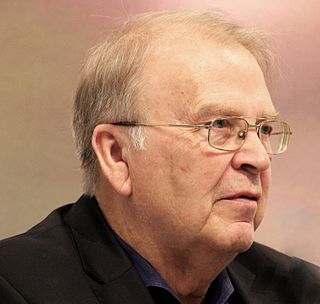
Wilhelm Genazino was a German journalist and author. He worked first as a journalist for the satirical magazine pardon and for Lesezeichen. From the early 1970s, he was a freelance writer who became known by a trilogy of novels, Abschaffel-Trilogie, completed in 1979. It was followed by more novels and two plays. Among his many awards is the prestigious Georg Büchner Prize.

Rudolf Simek is an Austrian philologist and religious studies scholar who is Professor and Chair of Ancient German and Nordic Studies at the University of Bonn. Simek specializes in Germanic studies, and is the author of several notable works on Germanic religion and mythology, Germanic peoples, Vikings, Old Norse literature, and the culture of Medieval Europe.

Günter de Bruyn was a German author.
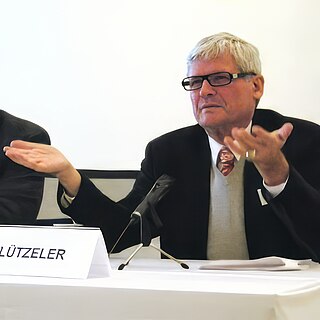
Paul Michael Lutzeler is a German-American scholar of German studies and comparative literature. He is the Rosa May Distinguished University Professor Emeritus in the Humanities at Washington University in St. Louis.

Klaus-Michael Bogdal is a professor of German literature at the Faculty of Linguistics and Literature at Bielefeld University.

Peter-André Alt is a German literary scholar, former president of the Freie Universitaet of Berlin and, since August 2018, president of the German Rectors' Conference (HRK). Alt is married to the writer Sabine Alt and has two adult sons.
Heinz Ludwig Arnold was a German literary journalist and publisher. He was also a leading advocate for contemporary literature.
Michael Scheffel is a professor for the history of modern German literature and more generally of Literary sciences at Wuppertal University. He is also a co-editor of Text+Kritik.

Jörg Baberowski is a German historian and Professor of Eastern European History at the Humboldt University of Berlin. He studies the history of the Soviet Union and Stalinist violence. Baberowski earlier served as Director of the Historical Institute and Dean of the Faculty of Philosophy I at the Humboldt University in Berlin.

Walter Hinck was a German Germanist and writer. He was professor of German literature at the University of Cologne from 1964 to 1987.
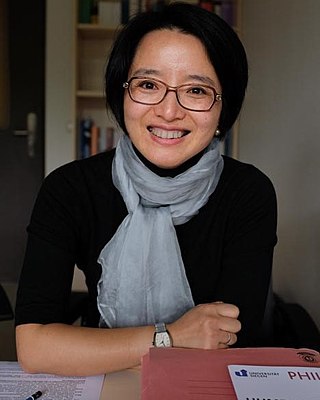
Zhao Jin is a Chinese professor of German linguistics and a scholar in cultural-analytical linguistics.
Ulrich Muhlack is a German historian.

The album amicorum was an early form of the poetry book, the autograph book and the modern friendship book. It emerged during the Reformation period, during which it was popular to collect autographs from noted reformers. In the 1700s, the trend of the friendship book was still mainly limited to the Protestant people, as opposed to the Catholics. These books were particularly popular with university students into the early decades of the 19th century. Noteworthy are the pre-printed pages of a friendship book from 1770 onwards, published as a loose-leaf collection by the bookbinder and pressman Johannes Carl Wiederhold (1743-1826) from Göttingen.
Martina Wagner-Egelhaaf is a Senior Professor at the University of Münster, Germany. She was a Professor of German Literature at the University of Münster, and held a chair in German Literary History with special focus on Modernity and Contemporary Literature. Her fields of research include Autobiography/Autofiction, Literary Theory, Rhetoric, Literary and Cultural Studies, Gender Studies, and the relation of Religion, Politics and Literature.
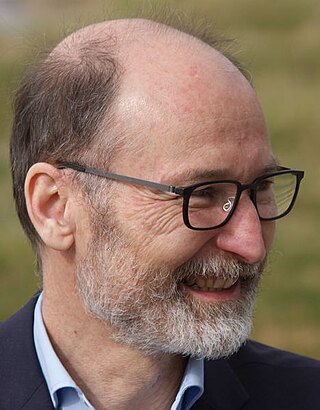
Sebastian Brather is a German medieval archaeologist and co-editor of Germanische Altertumskunde Online.
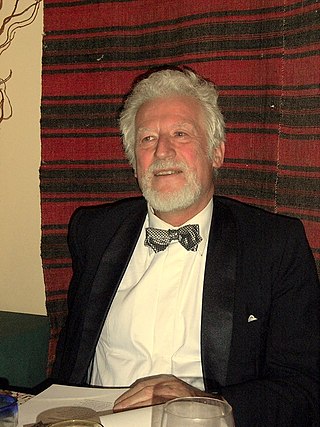
Helmut Birkhan is an Austrian philologist who is Professor Emeritus of Ancient German Language and Literature and the former Managing Director of the Institute for Germanic Studies at the University of Vienna.

Peter Kurzeck was a German writer.
Peter Uwe Hohendahl is an American literary and intellectual historian and theorist. He served as the Jacob Gould Schurman Professor of German Studies at Cornell University, where he is now a professor emeritus.














